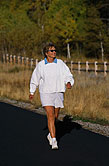
WEDNESDAY, March 5, 2014 (HealthDay News) — Taking daily walks of at least two miles can reduce hospitalizations from severe episodes of a life-threatening breathing disorder, new research suggests.
Scientists found that chronic obstructive pulmonary disease (COPD) patients without regular walking regimens had about twice the rate of hospitalizations triggered by the condition compared to those who maintained the highest levels of physical activity. This was defined as walking between roughly two and four miles each day.
“Of course, daily walking acts to improve the exercise capacity of these patients,” said study author Dr. Cristobal Esteban, a staff member in the respiratory service at Hospital Galdakao-Usansolo, in Spain. “Physical activity is a ‘medicine’ that will improve your general condition as well as COPD.”
The study appeared online recently in the journal Respirology.
The third-leading cause of death in the United States, COPD claims about 134,000 lives annually, according to the American Lung Association. COPD describes a group of progressive respiratory conditions that include emphysema and chronic bronchitis.
Smoking is the most common risk factor for the condition, but others include family history and inhaling pollutants such as fumes, chemicals and dust, according to the COPD Foundation.
For the new study, Esteban and his team recruited about 550 COPD patients from five Spanish respiratory clinics. The researchers calculated participants’ exercise totals based on self-reported tallies of the distance they walked during the course of a week. The data was compared to hospitalization records and patients were tracked for at least two years.
Patients who maintained moderate or high level of exercise — which in most cases equated to a walking regimen — were hospitalized only 53 percent as often as those who didn’t walk regularly, Esteban said.
Dr. Venessa Holland, a pulmonologist at Houston Methodist Hospital in Texas, said the study “helps solidify what we’ve been doing with patients with any obstructive lung disease.”
But Holland, who wasn’t involved in the research, said a “major flaw” in the study was the self-reported patient data. “We know people self-report by pure error,” she said. “There’s no real documentation [their mileage totals] happened.”
“Physical activity is important, as with all diseases, to improving health and quality of life,” she said. “People used to think that if you have COPD, you shouldn’t be physically active. This reinforces that you should.”
Study author Esteban recommended that COPD patients — who may have difficulty trekking long distances due to breathlessness — walk routinely with others or even with a dog to keep motivation levels high. Holland agreed, saying the support of family members and health care providers is crucial to help these patients stick with a walking regimen.
“If they’re motivated, they’ll continue,” Holland said. “I can’t tell you how many patients I have with severe lung disease who I haven’t had to hospitalize, but they’re proactive about physical activity.”
More information
To learn more about chronic obstructive pulmonary disease, visit the COPD Foundation.
Copyright © 2026 HealthDay. All rights reserved.

